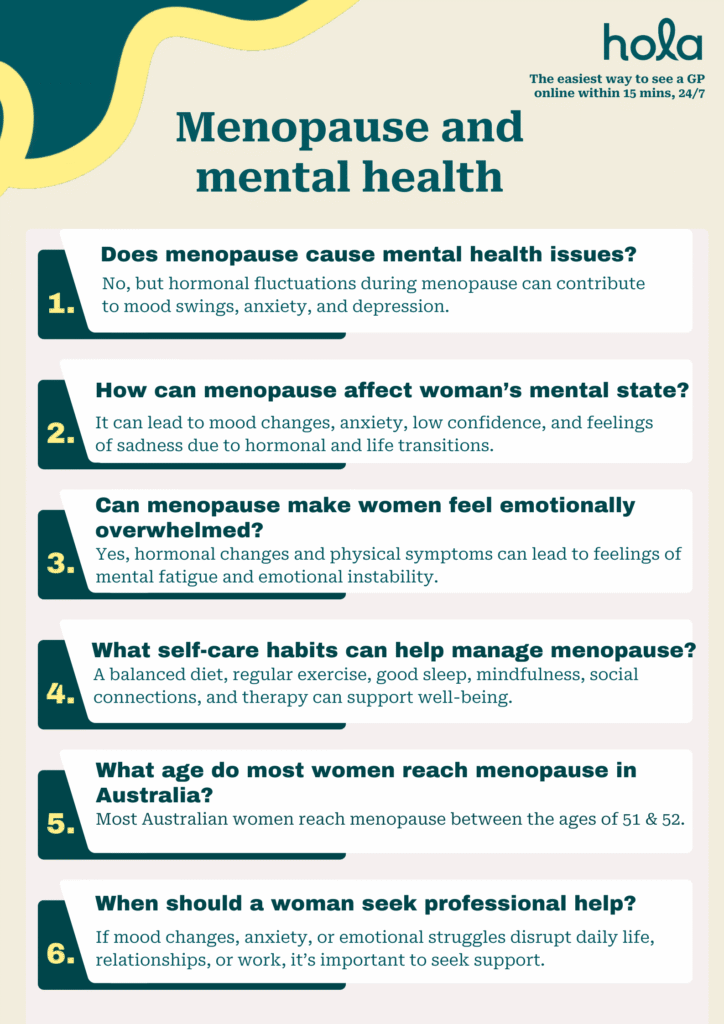How can menopause affect your mental health?
Written by editorial staff writer at Hola. Medically reviewed by Amira Shah, MA in Counselling Psychology, Registered Psychotherapist.

Contents

Introduction
Menopause isn’t just about saying goodbye to monthly cycles and hello to hot flashes—it is a whole new chapter in a woman’s life, filled with unexpected twists for the body and mind. While we often focus on the physical changes like night sweats and mood swings, the mental and emotional shifts can be equally intense. From sudden surges of anxiety to tearful moments that come out of nowhere, menopause can feel like a whirlwind of emotion. But behind the chaos lies a deeper story about shifting hormones, life transitions, and emotional well-being that deserves to be heard. Most women reach menopause between the ages of 45 and 55. In Australia, the average age to reach menopause is between 51 and 52.Does menopause cause mental health issues?
Menopause itself doesn’t directly cause mental health issues, but the hormonal fluctuations that come with it can contribute to mood swings, depression, and anxiety. Changes in oestrogen and progesterone levels influence brain chemistry, potentially leading to emotional and mental health difficulties. Sleep disruptions, life changes, and societal attitudes toward ageing can also affect mental well-being during menopause. Women with a history of depression are 2-3 times more likely to experience mood symptoms during perimenopause.
Also read: Signs of menopause at every age: All questions answered
What can menopause do to a woman mentally?
Menopause can profoundly affect a woman’s mental state due to hormonal shifts, physical symptoms, and life changes. It may lead to mood fluctuations, increased anxiety, and feelings of frustration or sadness. Some women may struggle with a loss of identity or self-worth as they transition out of their reproductive years. These shifts can affect confidence, cognitive clarity, and emotional well-being, though the impact differs from person to person. Support, self-care, and a constructive mindset can help manage these changes. Cognitive behavioural therapy (CBT) has shown 50-60% effective in managing menopause-related mood symptoms.
Also read: 11 Healthy habits for women over 50
Ready for positive change? Start your mental health care plan here.
How to control your emotions during menopause?
Managing emotions during menopause can be difficult, but there are several strategies to support emotional stability:- Maintain a healthy diet: Consuming a diet rich in vitamins, minerals, and healthy fats can help regulate hormones and boost emotional well-being.
- Exercise regularly: Exercise promotes the release of endorphins, which can elevate mood and ease stress.
- Prioritise sleep: Combat sleep troubles by establishing a calming nighttime routine, and avoid caffeine and heavy meals before sleeping to enhance rest.
- Practice mindfulness: These techniques support inner calm, ease anxiety, and strengthen emotional balance.
- Stay connected: Connecting with others and participating in enjoyable activities can lift your spirits and ease loneliness.
- Seek support: To ease emotional stress, share your emotions with family, friends, or a therapist. Support groups for women experiencing menopause can also be helpful.
Can menopause make you feel overwhelmed?
Menopause can indeed lead to feelings of emotional overwhelm. The shifts in hormones, particularly the reduction of estrogen, can result in mood variations, anxiety, irritability, and sometimes depression. Alongside physical symptoms such as hot flashes and issues with sleep, it’s not uncommon for women to feel mentally fatigued or emotionally unstable during this time.Self-care: physical and mental health symptoms related to menopause
Engaging in self-care is essential for managing the symptoms of menopause. On a physical level, a well-rounded diet, consistent exercise, and sufficient sleep can help alleviate discomfort. From a mental perspective, techniques like mindfulness, writing in a journal, deep breathing exercises, or seeking therapy can lessen anxiety and emotional strain. Maintaining social connections and participating in enjoyable activities also contributes to emotional health during this transition.
When to seek help
If you find that mood fluctuations, feelings of sadness, anxiety, or difficulties in handling daily tasks persist, it’s crucial to reach out to a healthcare provider. Mental health issues that disrupt relationships, work, or personal care should not be overlooked. Getting early support can significantly enhance the ability to handle these difficulties effectively.Treatment options for mental health symptoms
There are several options to address mental health symptoms during menopause. Cognitive Behavioural Therapy (CBT) is frequently effective for tackling anxiety, mood swings, and depression. Hormone Replacement Therapy (HRT) might also be suggested to help stabilise mood by correcting hormone imbalances. Additionally, in some situations, antidepressants can be offered for extra support. Natural remedies and supplements, including magnesium or herbal products, may prove helpful but should always be taken with the advice of a healthcare professional.
In the development of a Mental Health Treatment Plan (MHTP), your doctor can collaborate with you to formulate a customised approach that includes therapy, medication (if necessary), and lifestyle modifications. This plan ensures continuous support and access to suitable mental health resources.
Menopause might shake things up, but it doesn’t have to shake your foundation. With the right guidance, gentle self-care, and a good sense of humour, you can navigate the tides of change and emerge stronger, wiser, and just as amazing as ever.
Take control of your mental health. Begin your care plan now.
What we treat
- Cough
- Nausea & vomiting
- Fever
- Hayfever
- Fatigue
- Sore throat
- Acne
- Hair loss
- Gout
- Eczema
- Rosacea
- Sunburn
- UTI
- Erectile dysfunction
- Contraception
- Morning sickness
- Morning after pill
- Prostate health
- Anxiety
- Depression
- Stress
- Grief & loss
- Antidepressants
- Premature ejaculation
- Asthma
- Blood pressure
- Blood thinners
- Diabetes
- Cholesterol
- Migraines & headaches
- Allergies
- Body ache
- Heartburn & reflux
- Sleep disorder
- Pain relief
- Gastro
Related Articles
Disclaimer
This blog is for general informational purposes only and does not indicate that Hola Health provides all treatments or preventive measures mentioned. It is not intended to be a substitute for professional medical advice. Always seek the guidance of your doctor or other qualified health professional with any questions you may have regarding your health or a medical condition. For emergencies please immediately contact 000. Any medical topics discussed are intended to educate, not to imply availability through Hola Health.

Get affordable healthcare on your terms, with quick access to qualified, Australian-registered telehealth doctors & health practitioners, 24/7, 365 days a year. No more searching for ‘doctors near me‘ – Hola connects you instantly.
Address: 79 St Georges Terrace, Perth WA 6000


Hola Health App
Get affordable healthcare on your terms, with quick access to qualified, Australian-registered telehealth doctors & health practitioners, 24/7, 365 days a year. No more searching for ‘doctors near me‘ – Hola connects you instantly.
Call 000 for emergency or urgent medical help.
Address: 79 St Georges Terrace, Perth WA 6000
© Hola Health, a brand of Packapill Pvt Ltd


 Facebook
Facebook  X
X  Copy Link
Copy Link











